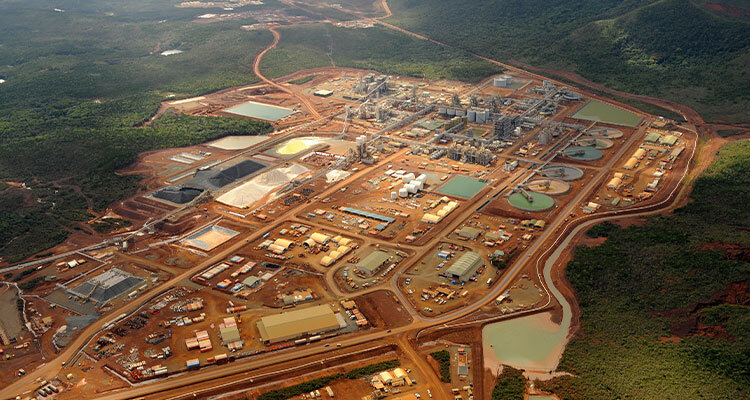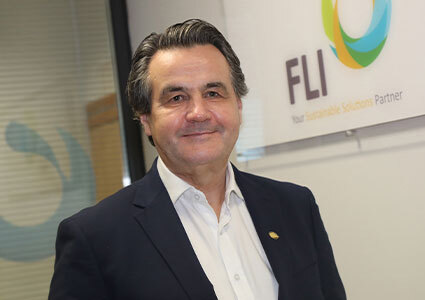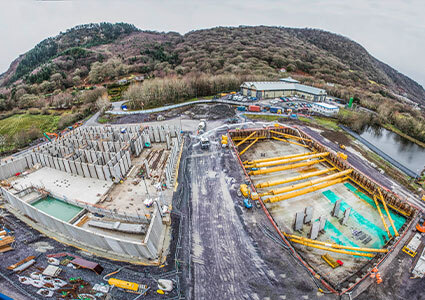
Through collaborative teamwork and innovative processes, FLI Group continues providing cutting-edge, technically-driven, environmental solutions to its wide ranging client base
Profitable since its foundation in 1989, the FLI Group (FLI) operates as a diverse group of companies providing environmental solutions, services, and technologies to clients worldwide. With a presence in the UK, Ireland, and beyond, FLI serves both private and public sector customers across several areas including contaminated land and groundwater remediation, municipal and industrial water and wastewater, geosynthetics, and the design and manufacturing of precast concrete infrastructure solutions. FLI prides itself on working with a broad range of customers who share the group’s vision for a more sustainable world. All companies adhere to the highest standards of project delivery and have achieved impressive levels of industry accreditations. Michael Flynn, Executive Chairman, Founder and CEO, shares insights into FLI’s journey.

“I established FLI Global Ltd, the parent company of our group, in 1989. At that time, we acted as a geosynthetics supply and installation business, providing project management and engineered solutions focused on the containment of liquid and solid waste. Environmental protection is the primary function of geomembranes and geosynthetics, and they remain an integral part of designed engineering solutions in solid waste management and mining waste containment globally. During that period, we generated significant growth opportunities and opened branches and subsidiaries in Ireland, the UK, France, Spain, and New Caledonia. In 2004, we decided to diversify into the wider environmental services and solutions business sector, with the acquisition of an emerging business in the UK called Vertase in 2005, which remains a strong, market leading, technically focused, brownfield and contaminated land remediation services company. Since its incorporation into the group, we have grown both organically and by acquisition, mainly in Ireland, the UK, and Europe, but also globally within the mining sector. After two years, we further diversified and expanded in the UK by acquiring a water and wastewater process engineering company and an M&E business. Then, we acquired a high-end precast concrete engineering design and manufacturing business in Ireland in 2018, which, at the time, specialised in designing and manufacturing stormwater management infrastructure. We recognised that this provided us with an opportunity to broaden our product range; within the broader environmental services market, the UK water utilities require large concrete structures capable of storing effluent, wastewater, clean water and drinking water. In 2018, we also acquired a UK-based industrial wastewater process engineering business to provide further diversification. As a result, FLI Global and its various subsidiaries now work with customers in a broad range of business sectors including all the major UK water utilities, data centre customers, Tier 1 contractors, land developers, food and beverage manufacturers, and logistics companies – to name a few!
“Our workforce includes 250 people with diverse engineering expertise, so we are well positioned to provide our clients with engineered solutions for a wide range of environmental and sustainability challenges. The value is in the solution, and early engagement with clients’ design teams leads to value engineering and more sustainable solutions.”
Redevelopment project
FLI Group’s series of acquisitions has proven to be very fruitful, with some even garnering prestigious awards. Michael discusses a notable project led by FLI’s VertaseFLI remediation business, which recently won the Brownfield Briefing Sustainability Award 2023 for its outstanding landfill remediation in Liverpool. “The work was carried out in an area of the River Mersey that was used as a waste landfill for construction waste activities from the docks and the wider Liverpool area from the 1930s through to the 1980s. In the early 1980s, the site was reprofiled to host the first International Garden Festival, with the intention of regenerating the area by enhancing business activity and promoting tourism. However, despite its location, the area fell into disrepair, remaining dormant until recent times. Liverpool City Council was granted planning permission for the creation of a development site in 2020, the first phase of which was processing waste and recovering any suitable materials to create a development platform.
 “The goal of the redevelopment was to address the environmental impact and geotechnical constraints imposed by the site’s history. To allow subsequent development, the significant quantities of waste landfill materials needed to be dealt with. VertaseFLI collaborated with Liverpool City Council, with Vinci acting as the principal contractor and Arup as the consultant. Our objective was to provide a sustainable remediation strategy and to execute it efficiently, so we engaged in the process from permitting through to validation of the works. VertaseFLI and our strong technical team excavated, processed, and reinstated approximately 400,000 cubic metres of materials, with a core strategy to avoid materials being removed off site. From the 800,000 tons we excavated, less than ten per cent was removed off site, and those that were, were repurposed for energy generation. This project demonstrates the advantages of the circular economy when reusing sites with complex histories and legacy, using technically robust engineering solutions to address complicated sites that would have otherwise remain in a state of disrepair.”
“The goal of the redevelopment was to address the environmental impact and geotechnical constraints imposed by the site’s history. To allow subsequent development, the significant quantities of waste landfill materials needed to be dealt with. VertaseFLI collaborated with Liverpool City Council, with Vinci acting as the principal contractor and Arup as the consultant. Our objective was to provide a sustainable remediation strategy and to execute it efficiently, so we engaged in the process from permitting through to validation of the works. VertaseFLI and our strong technical team excavated, processed, and reinstated approximately 400,000 cubic metres of materials, with a core strategy to avoid materials being removed off site. From the 800,000 tons we excavated, less than ten per cent was removed off site, and those that were, were repurposed for energy generation. This project demonstrates the advantages of the circular economy when reusing sites with complex histories and legacy, using technically robust engineering solutions to address complicated sites that would have otherwise remain in a state of disrepair.”
Offsite construction
Continuing its journey towards increasingly ambitious projects, FLI is currently working on what might be the largest drinking water reservoir in Europe. “Looking to future-proof its drinking water supplies, Northumbrian Water in South Tyneside through its Tier 1 contractor, Mott McDonald Bentley (MMB), engaged another of the FLI Global subsidiary companies, this time, FLI Precast, to design, manufacture and then build an underground reservoir for drinking water. The reservoir is about 100 metres long, 75 metres wide, and about the height of a three-storey house, with a capacity of around 43 million litres, equivalent to 17 Olympic-sized swimming pools. Remarkably, the structure has been manufactured and built off-site utilising the FLI Precast semi-precast process and subsequently transported to site. This endeavour showcases our enthusiasm for adopting offsite construction and rapid build systems, which provide many advantages. Indeed, as Northumbrian Water and their contractor are getting the site ready, we concurrently manufacture the concrete wall units offsite. We then bring the precast concrete units to site, enabling swift installation and seamless integration through on-site assembly of our precast sections and in situ concrete filling of the sectional structure, resulting in a homogenous watertight concrete structure. The underground reservoir is set to create storage for around 50,000 households and improve resilience for a further 200,000, all in the South Tyneside area,” he adds.
Michael also highlights the ability for such solutions to be used worldwide; probably one of the most significant challenges the FLI Precast team was asked to support was the construction of an off-site manufactured water storage tank, but to be installed in a remote location in Australia. Again, by creative thinking and the implementation of the innovative and collaborative values instilled within the group, the Precast team were able to design and manufacture concrete wall units, transport them in conventional shipping containers, and install them on site in Australia, in a more sustainable way than on-site construction. As the site was in a remote area of Australia, it was more cost effective for the client to use us, as we halved the construction work time required on site. This not only highlights the versatility and mobility of our systems, but focusses on the creative and innovative mindset and capability of our teams.”
As we enter the new year, Michael details his vision for the business in 2024. “We continue to operate and expand in our chosen markets, and remain dedicated to upholding our core values of working safely, enhancing trust between our teams and customers, and encouraging a collaborative environment. Continued innovation is also an ongoing process for us to address evolving environmental challenges and develop our product offering. Innovations to come include new offsite manufactured and panelised rapid build housing systems to tackle house building challenges in Ireland and the UK. Of course, sustainability will be a key focus in all aspects of the business,” he concludes.